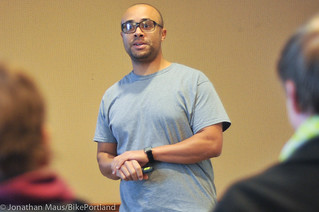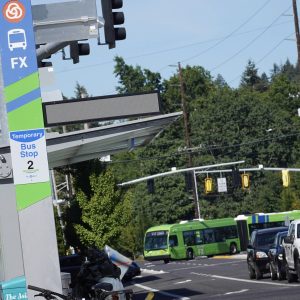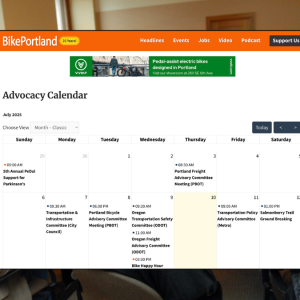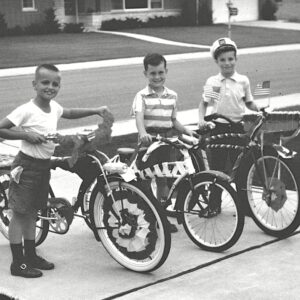After his first 50 days as the CEO of the Community Cycling Center, Mychal Tetteh sees a big problem in the local advocacy ecosystem: Too many people aren’t sure how, where and when to get engaged. And as a result, their voices aren’t being heard.
His solution? A crowd-sourced and curated compendium of all the region’s active transportation events, meetings, comment periods, open houses, and so on. All these things are “avenues to advocacy” that Tetteh would like to make accessible to Portlanders — especially those in underserved communities where many people have trouble meeting their basic needs.
Tetteh outlined his idea for the first time last Thursday at the monthly Bicycle Brown Bag discussion series hosted by the Portland Bureau of Transportation’s Active Transportation Division. The CCC also published more about it on their website this morning.
The CCC has always worked to bring the benefits of bicycling to underserved communities, and Tetteh’s new effort aims to do the same with advocacy. If lower-income and communities of color become involved with advocacy issues the thinking goes, the end result will better reflect community needs and bicycling (and walking) will become a more viable transportation option.
“Ultimately, we’re trying to create additional access opportunities for advocacy… We’re advocating for more advocacy.” he shared at City Hall last week. “I want to have everything that’s happening week-to-week curated; whether it’s walking, biking, and so on. And I want everyone to have access to that information.”
Tetteh shared a variety of inspirations for his idea. In his presentation at the Brown Bag, he took the audience through Maslow’s hierarchy of needs to make the point that, — unlike the housing communities where the CCC works like New Columbia and Hacienda CDC — most people currently involved in active transportation advocacy in Portland, “come from a community of privilege and don’t have to worry about the bottom of the pyramid [food, shelter, resources], so they can focus on the upper ones [creativity, achievement, and so on].”
“The main priority is to make sure we’re going to be able to get people from all walks of life access to information, as opposed to digging through a bunch of websites to find what they need.”
— Mychal Tetteh, CCC
Tetteh also said he’s “all out of patience” when it comes to moving the needle on progress for biking and walking in Portland. He pointed to our stagnant bicycle ridership numbers as a result of complacency. We’re complacent, he said, precisely because life is good in Portland. “Because it’s so much better here is why we can become complacent more than any other place in America.”
“Portland has taken this lead in active transportation; but we’re seeing our mode-share flatline. How are we going to push past that?” he asked.
Personal experiences have also shaped Tetteh’s view on this subject. He recounted a meeting he attended of the PBOT Bicycle Advisory Committee where he claims there was a discussion about what song rumble strips should play on TriMet’s new Portland Milwaukie Light Rail Bridge. “I thought, wow, what a luxury we have [to be having that discussion].” He also expressed disappointment at a transportation-related meeting he attended at Metro. “With about 13 people, we spent 30 minutes doing acronym acrobatics… It was not an effective use of my time or of those assembled,” he lamented. Turning his focus to BikePortland, Tetteh said a recent story we published about a flurry of important advocacy meetings required him to read the comments to find out specifics on where some meetings where being held. “I don’t want to have to dig into BikePortland comments — which can get kind of scary sometimes — to find out that information,” he said.
Tetteh’s ideal solution would be some sort of digital resource that would be crowd-sourced and easily used via mobile device and/or SMS.
“The main priority,” he said, “is to make sure we’re going to be able to get people from all walks of life access to information, as opposed to digging through a bunch of websites to find what they need. In the end it’s about getting our voices heard.”
Tetteh followed up his Brown Bag presentation with an email newsletter today where he fleshed out his idea further. “The infrastructure that we have in place to support active transportation advocates isn’t working as well as it should,” he wrote in the email. “I want to make sure that we are hearing the needs of advocates and can begin an engagement of stakeholders that will co-create the next generation advocacy network infrastructure… We believe that greater connectivity, capacity and accessibility in our advocacy network will help ensure success in campaigns that aim to improve the built environment through transportation projects.
Tetteh encourages anyone interesting in helping the CCC develop this new advocacy tool to email avenues@CommunityCyclingCenter.org. The next step will be to pull a meeting of interested parties together. Stay tuned.







Thanks for reading.
BikePortland has served this community with independent community journalism since 2005. We rely on subscriptions from readers like you to survive. Your financial support is vital in keeping this valuable resource alive and well.
Please subscribe today to strengthen and expand our work.
Maybe the advocacy groups need to work a bit more on figuring out (1) what people actually need/want and (2) what actually works from a practical/pragmatic standpoint, because I still see a lot of differences and discrepancies between what the advocates are advocating for, and not a whole lot of common ground among various advocacy groups these days, and this problem will likely only get worse as more people get involved.
I really like the sound of this! Sign me up.
I get what he is saying and advocating for, but I don’t think the reference to Maslow’s Hierarchy is really the best way to frame it.
First, Maslow takes a very individualistic approach to defining human needs, which probably should not be applied to community infrastructure.
Second, safety and security in movement is one of the most basic needs. This should be an issue for all, and particular people with fewer resources, as he notes.
Perhaps the bigger issue is that these forums for advocacy are usually taking place in a setting that feels exclusive (like City/Metro/County buildings) and makes privileged people feel comfortable. There would be value in bringing these regular meetings like the BAC to community centers in harder-to reach places, so the challenges of the stakeholders in those areas would be felt by the people getting to the meetings and making decisions. Getting out of the convenience and comfort zone is the key to understanding other people’s perspectives. Tetteh is doing important work and I am not sure if another mobile app is going to solve the problem, but if it helps build more advocates, all the better.
I agree with his points 110%.
There is a huge gap of understanding between the forces that create the infrastructure and what is actually needed, especially in the lower economic areas of town. Ridership is flat because the “city” conitues to develop the inner core at the expense of the outter rings of town, and the population of “the core” is pretty small when compaired to the population of the outer rings (which incidently are often the neighborhoods in the lower economic tiers).
Also I’ve noticed that when many advocates go into the poor neighborhoods really don’t know how poor people think or how to talk to them without soundling like they’re talking down to them. I don’t know how many times it can be said, but if you’re struggling to put food on the table and keep a roof over your head, you don’t have the luxury of being able to care much about carbon footprints or what ever else is “bicycling cause” of the day. If you go in looking like a MAMIL you’re going to get nowhere, becasue you’re wearing a”kit” that cost as much as their montly grocery bill and your bike looks like it’s a couple months of rent to them as well. All you end up doing is confirming that bicycling is an expensive recreation for the well off.
And the sad part is that the people that benifit the most from a low/no car life style are the people in the lower economic tiers. And statistically they are also the minorities that are seriously lacking in this cities ridership stats.
I also agree that as much as I want to be involved and participate, the information of meetings is seldom published (here) more than a day ahead of time, often it isn’t published untill after the event. And honestly I think that is why there is often why voices aren’t heard. Not everyone can drop everything at a moments notice to go and attend these funtions. the locations of said events are often Downtown at say 5 or 6 pm (when many are heading home from work and/or getting ready to sit down and have dinner) And honestly, at times I think it’s done on purpose specfically to keep real people out of the conversation.
Sure would be nice if we could have a week or more notice of these events, that way those of us that work normal jobs and have families could make time to attend some of these events.
As someone who is trying his hand at more advocacy, it sure would be great to have a handy calendar that one could access. Heck, even a little notice for these different meetings can mean going or not. Mobile device or no, even just a centralized online calendar would be a great help.
All the best, Mr. Tetteh. Looking forward to finding out more.
I like the Shift calendar, OBRA and orbike. I sometimes look at others but these three fairly well cover it all.
This is really exciting, inspiring stuff. I’m loving Mychal.
Mr. Tetteh has it half right; too many meetings are spent on minutiae. Unfortunately, he is taking for granted the necessity of having meetings at all.
People with small children, people who work alternate shifts, people who are taking care of elderly parents, people who don’t speak English, people who have to make dinner for their families; these are some of the people who can’t get to meetings.
Suggest instead of building a bulletin board that Mr. Tetteh work on opening up the community decision-making process to people who cannot now participate.
I’m pretty confused by this idea. Seems like the strategy/tactics aren’t tuned to the target audience.
A digital resource for mobile devices to hear the voices of the under served populations? And those same voices will contribute to the crowd-sourcing and curating of the content as well (otherwise the resulting information would be governed by more privileged voices)?
Here’s the list of tasks required by folks on the lower end of the hierarchy of needs:
– own and operate a mobile device
– gather content
– post content
– curate posted content (voting/ranking/tagging?)
– review curated content for interesting events
– attend events
My own experience with under served populations tells me it’s more about finding the right influencers and getting them involved and inspired. They have the one-on-one connections that can really make a difference.
You likely have those connections already, Mychal, so perhaps it’s more a matter of you identifying the appropriate events and then alerting your network of influencers?
I use orbike.com for a calendar to get a good sense of what is happening in the bike scene, added with OBRA when I want to know more about races. The calendar is good and the newsletter helpful.
More people should put their events on orBike. I realize that is not the answer to everything that Tetteh is talking about in this piece, but it would be nice to know more about what is happening in the area : Portland and where I’m from, Salem, we go back and forth a lot, cyclists do – let’s work together :))
Workshops, talks, meetings, and the rides and such. It’s all pretty much up there.